Mental recovery in sports is crucial for enhancing focus, resilience, and combating fatigue. Effective strategies include mindfulness practices, visualization techniques, and structured rest periods. These methods improve performance by reducing stress, boosting confidence, and preventing burnout. Regular incorporation of these strategies fosters a strong mental framework for athletes facing competitive challenges.
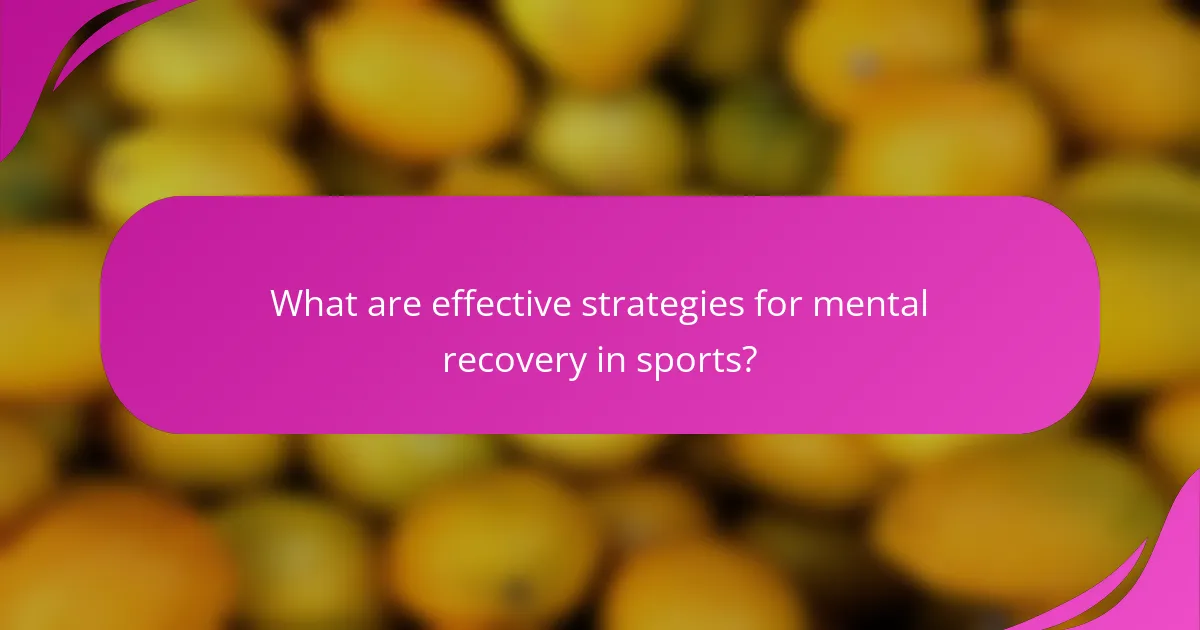
What are effective strategies for mental recovery in sports?
Effective strategies for mental recovery in sports include mindfulness, visualization, and structured rest. Mindfulness enhances focus by promoting present-moment awareness, while visualization techniques help athletes mentally rehearse performance scenarios. Structured rest periods, including active recovery and downtime, combat fatigue and prevent burnout. Regularly incorporating these strategies can significantly boost resilience and overall performance.
How does mental fatigue impact athletic performance?
Mental fatigue significantly impairs athletic performance by reducing focus, motivation, and decision-making abilities. Athletes may experience slower reaction times and decreased physical output. Strategies for mental recovery include mindfulness practices, adequate rest, and cognitive training, which enhance resilience and combat fatigue effectively. Research indicates that mental recovery can lead to improved performance metrics, such as increased endurance and better concentration during competitions.
What are the signs and symptoms of mental fatigue?
Mental fatigue manifests through decreased concentration, irritability, and a lack of motivation. Athletes may experience diminished performance, increased errors, and difficulty in decision-making. Recognizing these signs is crucial for implementing effective recovery strategies. Addressing mental fatigue promptly enhances resilience and focus, ultimately improving athletic performance.
What are the primary causes of mental fatigue in athletes?
Mental fatigue in athletes primarily stems from prolonged training, psychological stress, and insufficient recovery. Intense physical exertion depletes mental resources, leading to decreased focus and motivation. Psychological factors, such as performance pressure and anxiety, exacerbate fatigue. Additionally, inadequate rest and poor sleep quality hinder mental recovery, compounding fatigue effects. Implementing effective recovery strategies is essential for enhancing resilience and maintaining optimal performance.

What universal techniques aid in mental recovery?
Mental recovery in sports can be enhanced through techniques like mindfulness, visualization, and structured rest. Mindfulness improves focus by anchoring athletes in the present moment. Visualization aids in mental rehearsals, boosting confidence and performance. Structured rest is crucial for combating fatigue, allowing mental rejuvenation. These strategies collectively enhance resilience, enabling athletes to better manage stress and pressure.
How does proper sleep influence mental recovery?
Proper sleep significantly enhances mental recovery by improving focus, resilience, and reducing fatigue. Quality sleep restores cognitive functions, allowing athletes to process information and make decisions effectively. Research shows that sleep deprivation can lead to decreased attention span and impaired judgment, negatively affecting performance. Additionally, adequate rest supports emotional regulation, helping athletes manage stress and anxiety. Prioritizing sleep as part of recovery strategies is essential for optimal mental health in sports.
What role does nutrition play in combating mental fatigue?
Nutrition plays a crucial role in combating mental fatigue by providing essential nutrients that support cognitive function. Consuming a balanced diet rich in omega-3 fatty acids, antioxidants, and complex carbohydrates enhances brain health and improves focus. For example, foods like fatty fish, berries, and whole grains can reduce fatigue and boost resilience during athletic performance. Hydration is also vital; even mild dehydration can impair cognitive abilities. Prioritizing nutrient-dense meals and staying hydrated can significantly enhance mental recovery and performance in sports.
How can hydration levels affect focus and resilience?
Hydration levels significantly impact focus and resilience by influencing cognitive function and physical performance. Adequate hydration enhances concentration, reduces fatigue, and supports mental clarity. Studies show that even mild dehydration can impair attention and short-term memory, leading to decreased resilience during physical exertion. Athletes should aim for optimal hydration to maintain peak performance and mental agility.
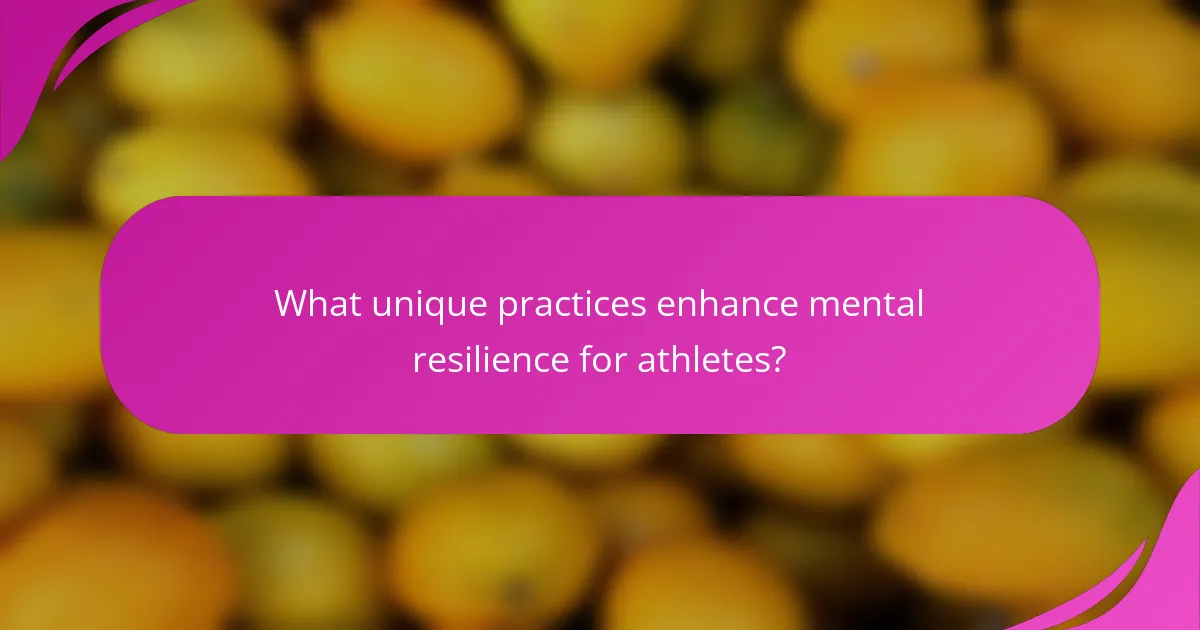
What unique practices enhance mental resilience for athletes?
Mindfulness, visualization, and positive self-talk uniquely enhance mental resilience for athletes. These practices improve focus, reduce anxiety, and foster a growth mindset.
Mindfulness techniques, such as meditation and breathing exercises, help athletes remain present, decreasing stress and enhancing performance. Visualization allows athletes to mentally rehearse scenarios, boosting confidence and preparedness. Positive self-talk combats negative thoughts, reinforcing belief in abilities and resilience.
Incorporating these strategies creates a robust mental framework, essential for overcoming challenges in competitive sports.
How can visualization techniques improve focus?
Visualization techniques significantly enhance focus by creating mental imagery that aligns with performance goals. These techniques enable athletes to mentally rehearse skills, improving concentration and reducing distractions. Research indicates that visualization can increase neural activity in the brain, similar to actual physical practice, which boosts mental resilience. Additionally, incorporating visualization into training routines can help combat fatigue by providing a mental escape, allowing athletes to recharge while maintaining focus on their objectives.
What is the impact of mindfulness on mental recovery?
Mindfulness significantly enhances mental recovery in sports by improving focus, resilience, and reducing fatigue. Research shows that mindfulness practices, such as meditation and breathing exercises, can lower stress levels and promote emotional regulation. Athletes who engage in mindfulness report increased awareness of their thoughts and feelings, leading to better performance under pressure. Additionally, mindfulness fosters a positive mindset, which is crucial for overcoming setbacks and maintaining motivation. Incorporating mindfulness techniques into training regimens can result in improved mental clarity and overall well-being.
How do goal-setting strategies foster resilience?
Goal-setting strategies enhance resilience by providing clear objectives and measurable progress. They help athletes maintain focus, adapt to challenges, and cultivate a growth mindset. Setting specific, achievable goals fosters a sense of control, reducing anxiety during competitions. As a result, athletes develop stronger coping mechanisms, enabling them to bounce back from setbacks more effectively. Research shows that structured goal-setting can significantly improve mental recovery and overall performance in sports.
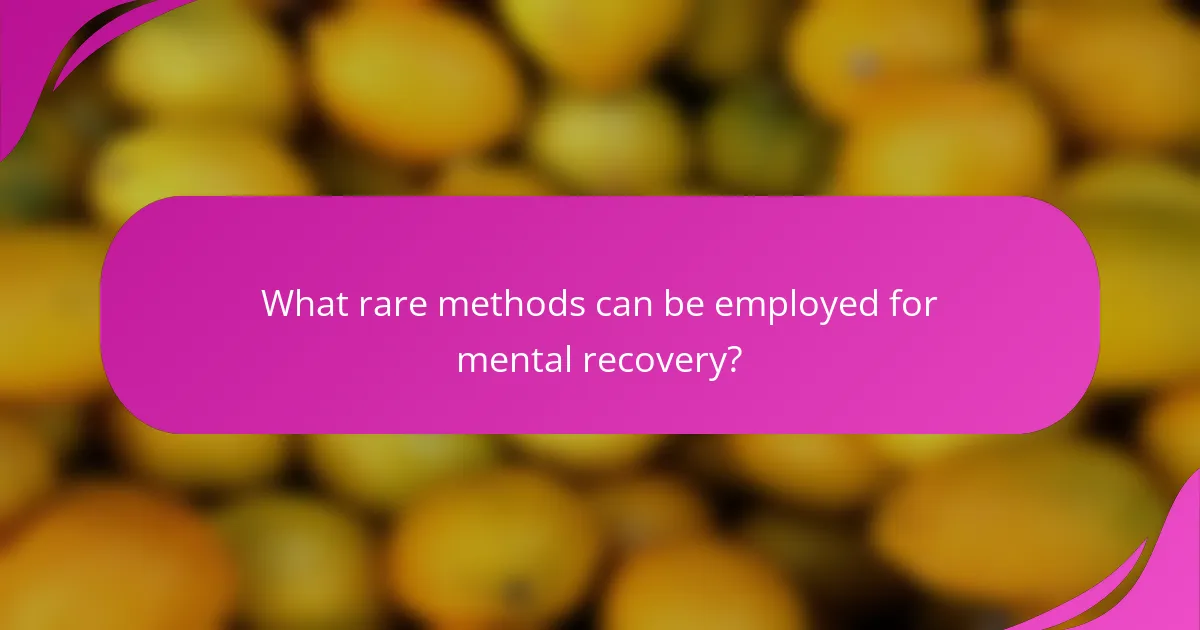
What rare methods can be employed for mental recovery?
Employing rare methods for mental recovery can significantly enhance athletes’ performance. Techniques such as neurofeedback training, which involves real-time monitoring of brain activity, can improve focus and emotional regulation. Another method is the use of virtual reality environments for exposure therapy, allowing athletes to rehearse mental resilience in simulated high-pressure situations. Mindfulness-based stress reduction, particularly in unique formats like nature immersion, can foster deeper relaxation and recovery. Lastly, the integration of biofeedback mechanisms can help athletes gain awareness of physiological responses, promoting better stress management.
How can cognitive behavioral therapy aid in recovery?
Cognitive behavioral therapy (CBT) aids recovery by enhancing mental resilience, improving focus, and reducing fatigue. It equips athletes with coping strategies to manage stress and anxiety effectively. CBT promotes positive thinking patterns, which can lead to improved performance and overall mental well-being. Research indicates that athletes who engage in CBT report lower levels of burnout and higher motivation. By addressing negative thoughts, CBT fosters a proactive approach to challenges, ultimately facilitating a more robust recovery process.
What role does neurofeedback play in mental performance?
Neurofeedback significantly enhances mental performance by training athletes to regulate their brain activity. This technique improves focus, resilience, and fatigue management, allowing for better game-time decision-making and emotional control. Studies indicate that neurofeedback can lead to a measurable increase in cognitive function, with athletes reporting heightened concentration and reduced anxiety levels. As a result, incorporating neurofeedback into training regimens can be a unique strategy for athletes aiming to optimize mental recovery and performance.
How can creative arts therapies contribute to recovery?
Creative arts therapies significantly enhance mental recovery in sports by promoting focus, resilience, and reducing fatigue. These therapies, such as art and music therapy, engage athletes in creative expression, which can alleviate stress and anxiety. As a result, they foster a positive mindset essential for performance recovery. Research indicates that incorporating creative arts into recovery routines can lead to improved emotional regulation and cognitive clarity, vital for athletic success.
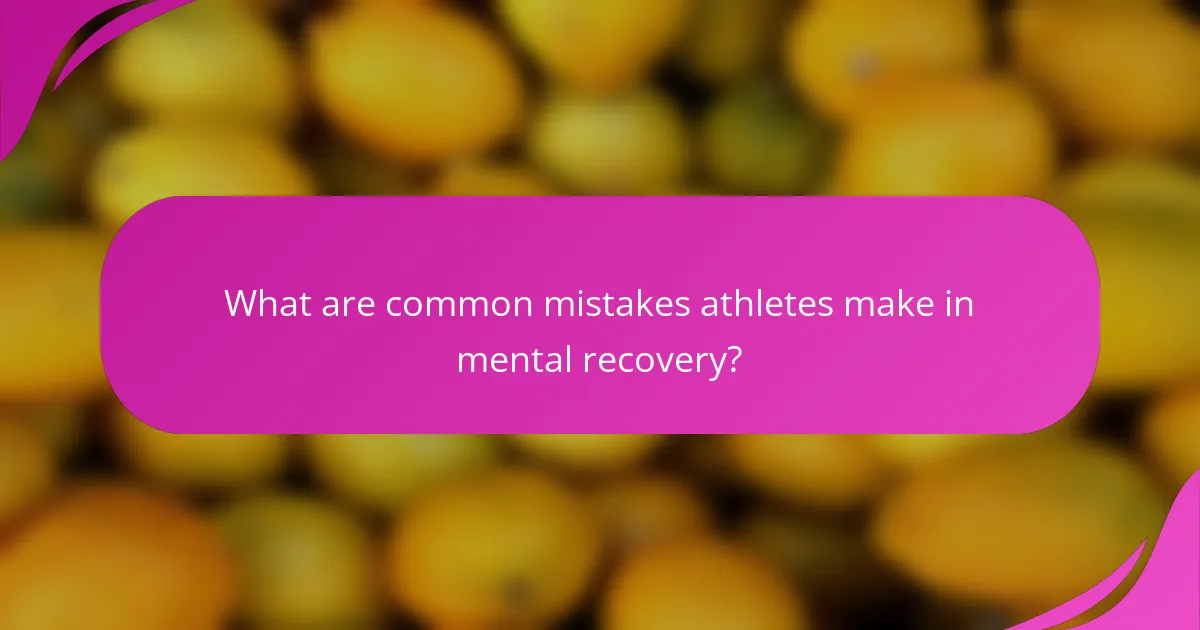
What are common mistakes athletes make in mental recovery?
Common mistakes athletes make in mental recovery include neglecting rest, underestimating the power of visualization, and failing to establish a post-competition routine. Many athletes prioritize physical training over mental strategies, which can hinder recovery. Additionally, not seeking professional support can lead to prolonged mental fatigue. Ignoring the importance of nutrition and hydration also affects mental clarity and resilience.
How can overtraining lead to increased mental fatigue?
Overtraining can significantly increase mental fatigue due to elevated stress levels and hormonal imbalances. As athletes push their physical limits without adequate recovery, cortisol levels rise, leading to decreased cognitive function and focus. This mental strain can manifest as exhaustion, irritability, and lack of motivation, ultimately hindering performance. Effective recovery strategies, such as proper rest, nutrition, and mental relaxation techniques, are crucial to combat this fatigue.
What are the pitfalls of neglecting mental health?
Neglecting mental health can lead to decreased performance, increased fatigue, and diminished focus in sports. Athletes may experience heightened anxiety, reduced resilience, and impaired decision-making. This neglect can also result in burnout, affecting overall well-being. Prioritizing mental health through strategies like mindfulness and mental recovery techniques is essential for sustaining peak performance.
How can athletes mismanage recovery time?
Athletes can mismanage recovery time by underestimating its importance, leading to increased fatigue and decreased performance. Common issues include inadequate rest periods, neglecting mental recovery strategies, and failing to listen to their bodies.
Many athletes prioritize physical training over mental recovery, which is crucial for focus and resilience. Research shows that mental fatigue can significantly impair athletic performance. For instance, athletes might skip relaxation techniques like meditation, which can enhance recovery and combat stress.
Additionally, poor time management can lead to rushed recovery processes. Athletes may overlook the need for sleep, which is vital for both physical recovery and cognitive function. Studies indicate that lack of sleep can negatively affect decision-making and reaction times in sports.
In summary, mismanagement of recovery time often stems from a lack of understanding of mental recovery’s role, insufficient rest, and poor time management, ultimately impacting athletic performance.
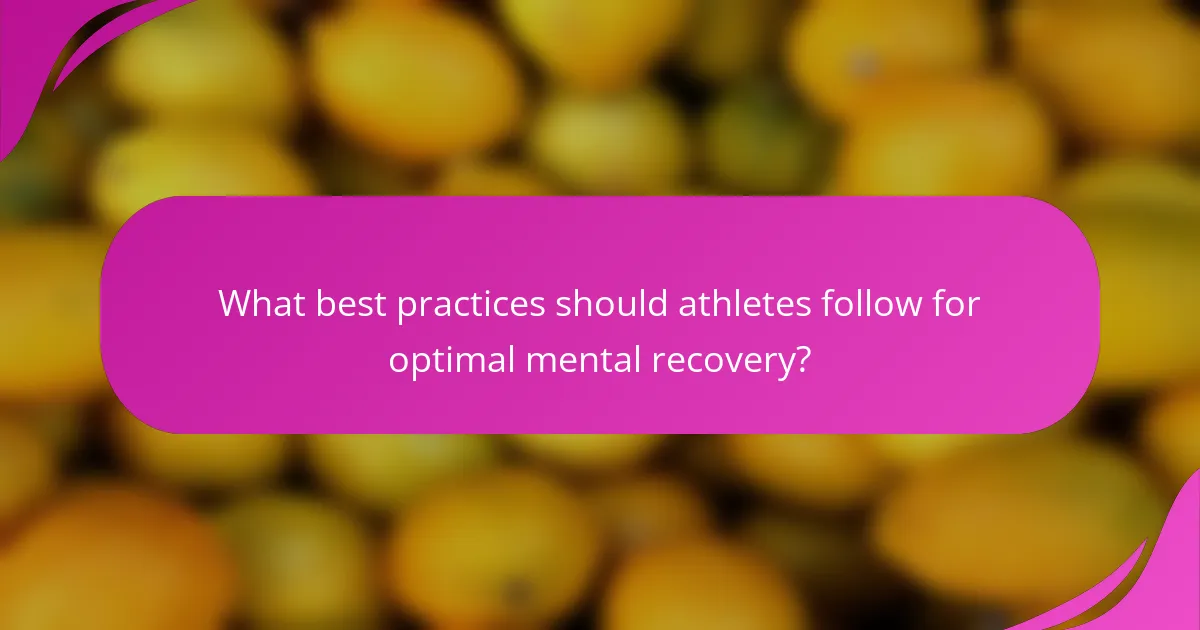
What best practices should athletes follow for optimal mental recovery?
Athletes should prioritize mental recovery through structured practices. These include mindfulness, visualization, and adequate rest to enhance focus and resilience. Incorporating techniques like deep breathing can significantly reduce stress and combat fatigue. Engaging in regular mental training sessions fosters a positive mindset, which is essential for performance.
How can developing a recovery routine enhance performance?
Developing a recovery routine enhances performance by improving focus, resilience, and reducing fatigue. A structured approach allows athletes to mentally reset, leading to better concentration during training and competitions. Regular recovery practices, such as mindfulness and proper sleep, significantly boost mental clarity and decision-making skills. Studies show that athletes who prioritize recovery report increased energy levels and reduced anxiety, contributing to overall performance enhancement.
What tools and resources are available for mental recovery?
To support mental recovery in sports, various tools and resources are available. These include mindfulness techniques, cognitive behavioral therapy apps, and resilience training programs. Mindfulness practices enhance focus and reduce anxiety, while therapy apps provide accessible mental health support. Resilience training builds mental strength, helping athletes to combat fatigue effectively.
How can athletes maintain focus and resilience during competition?
Athletes can maintain focus and resilience during competition by employing mental recovery strategies. Techniques such as visualization, mindfulness, and controlled breathing enhance concentration and reduce anxiety. Regular mental conditioning practices build resilience, allowing athletes to better manage stress and fatigue. Engaging in positive self-talk reinforces confidence, while setting clear goals provides direction and purpose during competition.
What expert insights can guide mental recovery strategies?
Expert insights for mental recovery strategies in sports emphasize the importance of structured routines, mindfulness practices, and cognitive behavioral techniques. These strategies enhance focus, build resilience, and reduce fatigue. For instance, incorporating daily mindfulness exercises can improve concentration by up to 20%. Cognitive behavioral techniques help athletes reframe negative thoughts, promoting a positive mindset essential for recovery. Additionally, establishing a consistent routine aids in maintaining mental clarity and emotional stability during intense training periods.